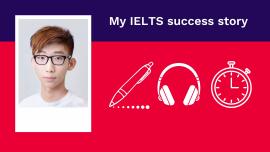The average IELTS band score ranges between 6.5 to 8. For many people, getting an IELTS Band 7 is a motivating factor to study and to achieve an impressive result from one of the most prestigious English proficiency tests available.
Yu Bilin was born and raised in Inner Mongolia, China, and he secured an overall band score 7.5 in his IELTS test. His story offers core insights into how to get top marks in the exam, and access new, exciting pathways in life.
The challenge: achieving an IELTS score 7 to study abroad
Yu has taken IELTS three times, so he has a lot of experience in preparing for the exam. His first IELTS experience was when he had just graduated in China. He needed a good IELTS score in order to apply to different schools overseas and fulfil his ambition to do a Masters course abroad. “If I had failed IELTS the first time, I would have stayed in China”, he says.
Yu was considering studying in Canada or Australia and received offers from three schools. He settled on Canada because longer-term immigration opportunities were more attractive there. In 2015, Yu started a Masters course studying Digital Media at Simon Fraser University in British Columbia.
Yu took IELTS a second time because he wanted to teach English to Chinese students as a side gig while he was studying. He felt that taking the exam was a good way to confirm that his English was up to par so he could give his students the help that they needed and be an effective English teacher.
Yu had stopped teaching, finished his studies at Simon Fraser University, and found work as a full time UX designer in Canada when he decided to take IELTS for the third time, just last year. He wanted to restart teaching, and once again, wanted to check that his English was aligned with IELTS standards – after all, he would be helping students taking the exam.
So, how did Yu prepare for IELTS and achieve the score he needed? Let’s find out.
“I was working around the clock. It was worth it”
When Yu was preparing for the exam the first time, he was living in a dormitory with roommates and found it hard to concentrate. He decided to check into a hotel for a month to ensure that he didn’t have distractions. “I was working around the clock”, he says. “It was worth it.”
Yu remembers that speaking was particularly challenging at that time because he couldn’t find a qualified English-speaking person for conversation practice in China. “During my time in the hotel, I would write in the morning, complete exercises in study books, and memorise good words and sentences to use for writing. Then, the rest of the day I would speak to myself in English. I spent about 70% of my time and effort on speaking. I would record myself speaking and listen back to see how fluent I was.”
The gold standard of English proficiency tests
Each time Yu took IELTS he opted for the paper version of the exam. “I feel more comfortable reading on paper. I can take notes and highlight faster by hand than on a computer.” Yu emphasises that it’s important for test takers to really think about what format suits them best, and select that option. He adds that with computer-based exams, candidates have to know the technology as well as the test content. It’s important to consider your typing skills, your understanding of digital navigation, and your ability to take notes and utilise technology in a way that enhances, not limits, the test-taking experience.
Yu also shares that IELTS is a prestigious test and so the topics are thought-provoking. “Questions like ‘do you think AI will replace human beings?’ are being asked to candidates. Students really need a solid English foundation to respond well.”
Yu is still working full time as a UX designer, but recently restarted his teaching work, specialising in helping people to prepare for IELTS. After the pandemic and corresponding shift to remote working, he mostly sees people through a screen. So, he wanted a job where he could meet with people face to face and feel a sense of achievement. “Often, once my students have passed IELTS, I feel more excited than they do!” he explains.
With both his personal and professional IELTS experience, Yu believes that IELTS is the gold standard of English proficiency tests. “Some schools advertise that they can help students pass IELTS quickly and easily, but that’s not the case.”
Depending on students’ level of English, Yu recommends dedicating at least six months to study if they want to get an IELTS band 7, and making full use of the British Council’s study resources, as well as their own materials to secure top marks.
Learn more about how to prepare for IELTS with the British Council to make sure you get the score you need!
